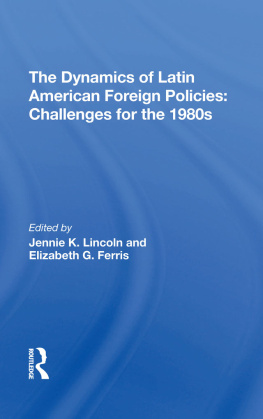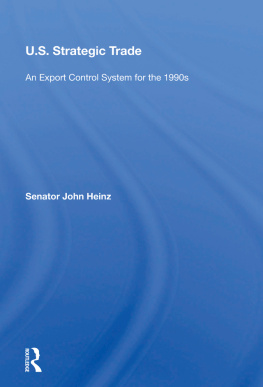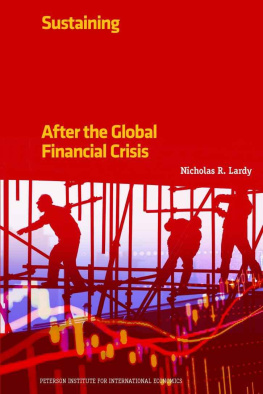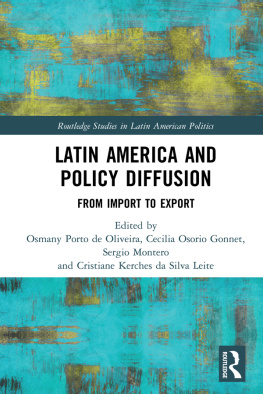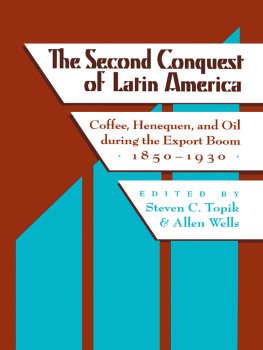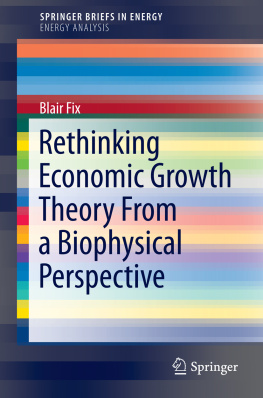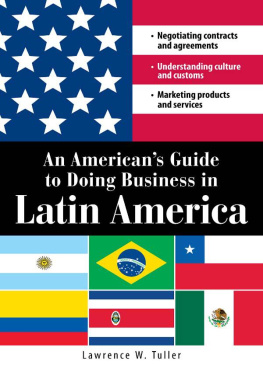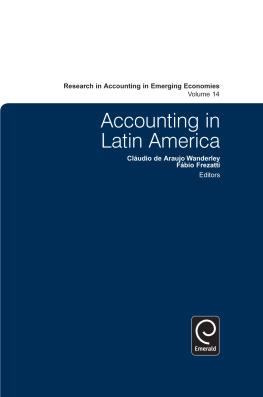First published 2000 by Ashgate Publishing
Reissued 2018 by Routledge
2 Park Square, Milton Park, Abingdon, Oxon OX14 4RN
711 Third Avenue, New York, NY 10017, USA
Routledge is an imprint of the Taylor & Francis Group, an informa business
Copyright Sheila Amin Gutirrez de Pieres and Michael J. Ferrantino 2000
All rights reserved. No part of this book may be reprinted or reproduced or utilised in any form or by any electronic, mechanical, or other means, now known or hereafter invented, including photocopying and recording, or in any information storage or retrieval system, without permission in writing from the publishers.
Notice:
Product or corporate names may be trademarks or registered trademarks, and are used only for identification and explanation without intent to infringe.
Publisher's Note
The publisher has gone to great lengths to ensure the quality of this reprint but points out that some imperfections in the original copies may be apparent.
Disclaimer
The publisher has made every effort to trace copyright holders and welcomes correspondence from those they have been unable to contact.
A Library of Congress record exists under LC control number: 00130119
ISBN 13: 978-1-138-70432-9 (hbk)
ISBN 13: 978-1-315-20276-1 (ebk)
Furthermore, my child, you must realize that writing books involves endless hard work, and that much study wearies the body.
- Ecclesiastes 12:12.
This book began with a discussion on the campus of Southern Methodist University in late 1992, when one of the coauthors was teaching there and the other was in residence at the University of Arkansas in Fayetteville. One of us had done very little work on the Latin American economies, being primarily absorbed in microeconometric work related to India. The other was a macroeconomic theorist, motivated by recent developments in Latin America but just beginning the transition to empirical work. In general, theorists and empiricists ought to collaborate more often; at least this is what normative views of progress in science tell us ought to happen. Anyway, it seemed like a good idea at the time. It is for the reader to judge whether this particular collaboration has yielded fruitful insights or not.
At first, we had no notion that we were writing a book. The canons of professional advancement for economists indicate that research should be released in discrete chunks the size of journal articles, and books are supposed to be for senior economists. After working on export diversification and growth in Latin America for awhile, though, it became apparent that the whole might be greater than the sum of the parts, and that a synthetic, cross-country perspective would help us to draw out the implications of our research agenda. After much helpful support and encouragement from Dr. Brian Berry, we decided to expand upon our previous work into its present form.
A previous version of the material in material for this volume. We have made some minor corrections to the original published material, such as updating references to working papers which have since become accessible as published articles. As will be apparent, our thinking on the central questions of the research agenda has evolved over time. In the case of material previously published elsewhere, we have let our original statements stand rather than attempt to enforce an arbitrary consistency.
We are particularly grateful to Grant Gardner, mutual friend and colleague, for performing the requisite introductions and inadvertently giving birth to this research agenda. We are greatly indebted to our most formative teachers in the economics of international trade and economic development, particularly to Robert Evenson, T.N. Srinivasan and Carlos Daz-Alejandro for Michael and Kent Kimbrough, Anne O. Krueger, Philip Brock, and Robert Bates for Sheila. Sheila would also like to acknowledge Dr. Steve Pejovich, who continually encourages her to reach for new challenges, and to honor the memory of G. Douglas Jenkins, whose advice she recalls often in her pursuit to be a scholar and academic. Conference participants at the following annual conferences, during 1992-1998, American Economics Association Meetings held in conjunction with the Allied Social Sciences Association, Southern Economic Association, and Business Association for Latin American Studies and at the U.S. International Trade Commission for helpful comments. Special thanks to Joseph Ziegler, economics department head at the University of Arkansas, who was very supportive of this not so mainstream line of research and never complained about the high phone bills and travel costs associated with this line of research. We also would like to thank the College of Business at the University of Arkansas for a small international grant that allowed us to hire Joyce Roberts to input data. Also certain data for Colombia was collected while Sheila was on a Fulbright Senior Research/Lecture Grant in Colombia in 1994. The invaluable editorial support of the staff, particularly Mrs. Claire Annals, at Ashgate Publishing Limited throughout all stages of the process has been greatly appreciated. Able research assistance was provided by Nurlan Turdaliev and Rodolfo Hernandez. Also to the participants of POEC 6376: Policy Research Workshop: Latin American Policy Analysis, at The University of Texas at Dallas, who worked on individual country projects and updated the data files. A special thanks to Inske Zandvliet (and Dr. Euel Elliott for assigning her time to me) for all her invaluable assistance in the preparation of the manuscript and the index. A final thanks must go to Sheila's parents for their support (including countless hours of babysitting) while we were rushing to meet deadlines.
In particular, we are grateful for the support of Victor Gutirrez de Pieres and Karen Burrell. Their encouragement and good humor (Victor's, while Sheila was writing and computing in Dallas, and Karen's, while Michael was doing the same in Fredericksburg) have sustained us throughout the process of being first-time authors. This book is dedicated to them, our spouses.
As is always the case, any deficiency in the present volume is not to be attributed to any of the above persons, but solely to the authors themselves. In particular, it should be noted that the views expressed in this book are those of the authors, and none of the views expressed herein are meant to represent the views of the U.S. International Trade Commission, any of its individual Commissioners, or indeed of any of our current or former employers.




